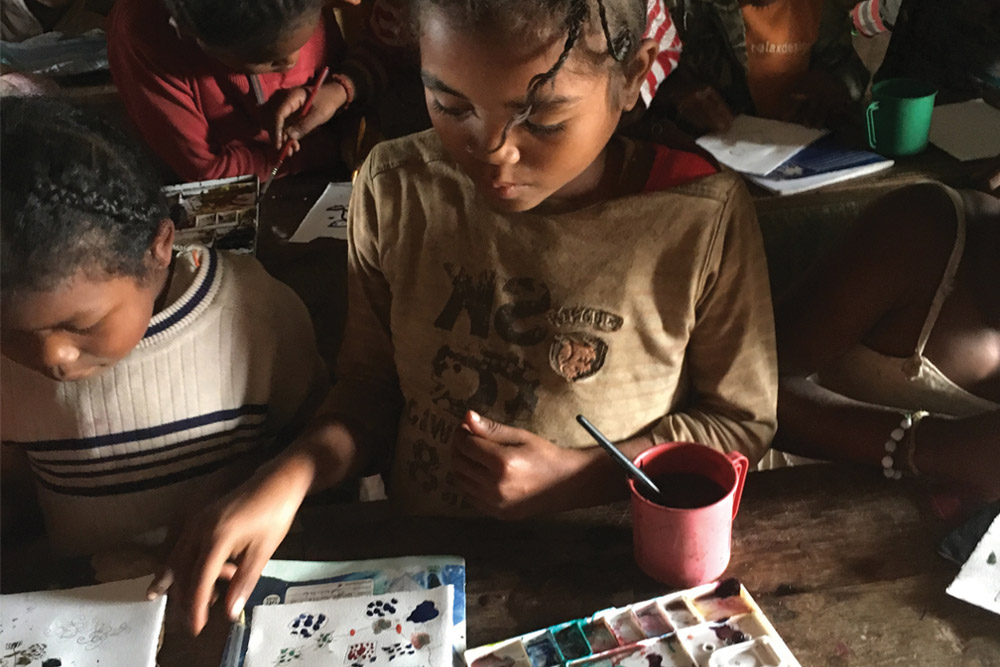Studying best practices in education has taken Devin Thornburg, Ph.D., professor of education at Adelphi, all over the globe.
 Studying best practices in education has taken Devin Thornburg, Ph.D., professor of education at Adelphi, all over the globe. Whether it’s visiting a school library in Argentina, creating nature paintings with students in Madagascar or discussing holistic health education in Spain, Dr. Thornburg believes global perspectives can lead to powerful reform in the American education system.
Studying best practices in education has taken Devin Thornburg, Ph.D., professor of education at Adelphi, all over the globe. Whether it’s visiting a school library in Argentina, creating nature paintings with students in Madagascar or discussing holistic health education in Spain, Dr. Thornburg believes global perspectives can lead to powerful reform in the American education system.
A champion of immigrant and multilingual students, Dr. Thornburg believes schools should embrace the strengths of a multilingual population. “Why are we continuing to treat second-language learning as a disadvantage when kids who are learning a second or third language should be at an advantage in our schools?” he said. “Their academic capacity should be greater, not less.”
In “International Perspectives on Trauma and Resilience Among Immigrant Students,” a paper presented in May 2018 at the 8th International Conference on Education and Educational Psychology, Dr. Thornburg details his analysis of 28 immigrant students in New York City public schools between grades eight and 12. Along with research collaborator Anne Mungai, Ph.D., interim dean of the Ruth S. Ammon School of Education, Dr. Thornburg studied a group of students from 10 countries across four continents. “We found that the majority of students experienced trauma-related stressors of racism, xenophobia, loss of family and language/social isolation, while also describing resiliency-related factors, including peer interactions and family supports,” he wrote.
Dr. Thornburg—who spends at least two days each week working with teachers and administrators within public schools—said a cultural shift is necessary for these students to thrive. “My entire career has been focused on current teachers who have found strategies that work and are challenged mostly by the diversity of the students they are teaching,” he explained. “But if I can bring their stories to an audience of researchers, then we can begin to change how we understand reform. It’s really less about trying to get teachers to do things differently, and more about shifting a  reformer’s focus so they can become strategically able to help in ways that they haven’t before.”
reformer’s focus so they can become strategically able to help in ways that they haven’t before.”
Limited resources for non-native English speakers translate into a lifetime of struggle for many students. “The number of second-language kids who end up in special education in this state is huge, because schools don’t know how to work with them,” Dr. Thornburg said. “They treat them as ‘other’ and the kids end up being identified as having something wrong with them. They go into special education and, more times than not, they drop out of school. And they often end up going into prison by age 25 because they can’t economically survive.”
To help put an end to this dynamic, Dr. Thornburg challenges his students at Adelphi to investigate their own cultural experiences. “Our students benefit not only from looking at our own cultural backgrounds—which is not easy for anyone— but also by looking at how our school system has become based on a cultural framework, how that is pretty limited. I also want them to see how they can bring a much deeper understanding of how to change the culture of schools into their own teaching,” he said. “This is what all of this has to do with Adelphi. Every course I have taught in the last decade has been devoted to that idea.”
Dr. Thornburg is currently writing and preparing two books. “The first is about trust in schools as it relates to school reform,” he said. “It will consist of in-depth interviews of teachers and students to look at issues of trust which will allow us to experience the context that they’re coming from.”
The second book will focus on adolescent development around the world, with contributions from educators in diverse settings. “Twelve different authors from 12 countries are writing about what they have done to meet the needs of their adolescents,” said Dr. Thornburg. “This is what I’m passionate about—lessons that will serve as a platform for change.”
Devin Thornburg, Ph.D., has traveled around the world researching best practices in education, focusing on teaching and learning with at-risk and diverse learners, beliefs about assessment and knowledge, and the way cultures are created in classrooms and schools. A perennially popular professor, he has been voted the Adelphi University Student Association Professor of the Year four times.
For further information, please contact:
Todd Wilson
Strategic Communications Director
p – 516.237.8634
e – twilson@adelphi.edu